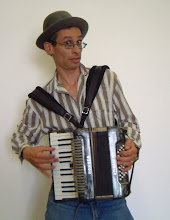We had an interesting discussion going about Galois Theory over the last little while, so I'm a bit loath to change direction in mid-stream, but I'm still working on getting all my Jewish Post articles up on the internet. So here's another one, this time about Yiddish spelling.
---------------------------------------------------------------
My regular readers will have noticed that sometimes
I include a short passage of transcribed Yiddish in my articles. Last week I
quoted the memoirs of Yekhezkel Kotik, where he desccribes the jealousy of the
poor Orthodox village priest at the luxurious lifestyle of his Polish Catholic
counterpart, with his lavish mansion and his four beautiful “sisters” living
together with him:
“Nur der orimer Rusisher galakh, velkher flegt
platsn far kine fun dem raykhn lukses-lebn fun dem katoylishn galakh, hot far
zayne poyerim, di poreytsishe layb-knekht geshvoyren, az di sheyne fraylayns
zaynen gor nisht zayne shvester, zey zaynen im vild-fremde, kokhankes zaynen
zey im…”
Except that’s not exactly the way it appeared last
week. (The original is shown at the bottom of this article.) What you see above
is the official transcription system mandated back in the 1920’s by the
Vilna-based Jewish Scientific Institute, the
Jüdische Wissenschaftlicher Institute, or YIVO (the acronym being derived from their own phonetic spelling: Yidishe Visenshaftlikhe Institut). It
was kind of like our own version of the French Academy, except for Yiddish.
Just as the French Academy sees one of its main
goals as the safeguarding of the purity of the language from foreign
(especially English) pollution, so was YIVO’s greatest concern in those days
the incursion of Germanisms, which were known as daytshmerisms. (That word is a bit of a puzzle, by the way, for
which I have never found a wholly satisfactory explantion. My best theory is
that the ending comes from Mähren, the
German name for Moravia, hence Deutsch-Mährisch.)
Expecially offensive to YIVO was the suggestion that
Yiddish was not a real language, but merely a zhargon, a corrupt version of German. Thus motivated, we can see
why YIVO would have sought to impose a stricty phonetic spelling system where,
for example, “chutzpah” is spelled khutspe
and “schmaltz” is spelled shmalts. In
effect, YIVO proclaims to all the world that whatever Germanic or other origins
a word may have is simply…irrelevant. I remember a conversation I once had with
a Yiddish academic as to the origin of a word, I think it was golen, meaning “to shave”. Was it a
German word or a Hebrew word, I asked? The Professor was unperturbed. “It is a Yiddish word”, he answered with
finality, as though that were all that needed be said.
If there’s anything I’ve learned about Yiddish, it’s
that the origins of a word were anything but “irrelevant”. We are taught in
school that some English words come from Latin, and some come from Greek; but
when we speak English, those origins are completely invisible to us. They’re
all just words. Yiddish was totally
different. Every Yiddish speaker, no matter how uneducated, knew instinctively
if a word came from German, Hebrew, or Russian. The nuance carried by a word or
phrase was often strongly influenced by its origins. The YIVO academics could
fume that it was demeaning for writers to substitute loftier-sounding German
expressions for everyday Hebrew terms (like gesicht
instead of ponim, as Yehoash did in
his translation of the first verse of Genesis); but like it or not, that kind
of “code-switching” was deeply ingrained in the language and the culture. Often
it was used for humorous effect. Either way, the mixed heritage of Yiddish was
a defining aspect of its character, and not something to be ashamed of.
But more than that, I think we’re cutting off our
nose to spite our face if we ignore the German yikhus of our language. If we care at all about preserving Yiddish,
then its relationship to German is for my money the biggest asset we have. We
have a huge body of literature, historical writing, and music which we, in
North America, have all but abandoned. We send our children to Hebrew School,
and then to University where they can fritter away years taking courses in
History of Film or Feminist Psychology or whatever, and I’m saying maybe they
should take a course in Intro German. Because with a smattering of Hebrew and
German under your belt, you’d be surprised how accessible that enormous body of
Yiddish becomes, and what a window it opens into our past.
So my solution is that we transcribe Yiddish in a
way that reflects as much as possible the two great languages from it is
descended. There are some suttleties here and there involving vowel shifts
which I think I’ve dealt with rather well with a cunning system õf döts ând
squiggles. Maybe I’ll talk about it in more detail another time. But for now,
here is the passage I started out with, re-written using my Germanized system.
I think compared with the YIVO phonetics (at the top of this article) it looks
pretty cool my way:
“Nur der ârimer Russischer galakh, welcher flegt platzen far kinah (envy) vun dem reichen luxus-leben vun dem Kathòlischen
galakh, hât var seine pauerim, die poretzische
leib-knecht (the squire’s serfs) geschwòren, as die schöene Fräuleins
seinen gâr nischt seine schwester, séi seinen ihm wild-fremde (total
strangers), kokhankes seinen séi ihm…”

2 comments:
Love this blog!!! Helped soo much..
IB Higher Level Physics | IB Standard Level Physics
Interesting thoughts and suggestions. Your decisions are original. You share your knowledge andwww.writing-help.org/blog/the-patriot-act-essay
maintain interest in the blog. This is interesting to many.
Post a Comment